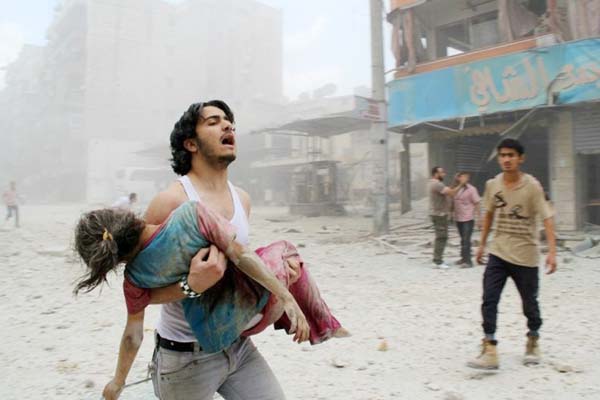
AP, Beirut :
In a world gripped by a pandemic, global unrest and a fast-moving news cycle, it can be difficult to remember that the war in Syria is still happening.
Even before the coronavirus outbreak took over daily lives around the globe, the conflict, which began in early 2011, had largely fallen off the world’s collective radars – reduced to a never-ending fight involving an ever-more complex web of players and refugees that few remember once lived in a country they called home.
But as it enters its tenth year, the war – which gave rise to the Islamic State group and triggered the worst humanitarian catastrophe of the 21st century – has shown it is still creating new tragedies that can have an outsized impact on global politics.
Earlier this month, Turkish and Syrian troops were clashing in Syria’s northwest. That brought NATO-member Turkey and Russia, which back opposing sides of the war, to the brink of direct confrontation, and produced an unprecedented wave of displaced people. Arguing that it faces a potential new influx of refugees from Syria, Turkey announced it would no longer stop its vast migrant and refugee population from illegally entering Greece, touching off a new crisis for the European Union.
More than half of Syria’s pre-war population of 23 million people have been driven from their homes, and a staggering 80% of the population live beneath the poverty line, according to the United Nations. Half the country lies in ruins. A political process does not exist. Contrary to what some may hope, the Syrian war is nowhere near its end-game.
A cease-fire brokered by the Turkish and Russian presidents in Moscow last week may have put the brakes on the Syrian government’s devastating military campaign to retake the northwestern Idlib province. But the halt is not a long-term solution, and the war’s final and most devastating chapter is yet to come.
In the three months before it was paused, the Syrian offensive triggered the largest single wave of displacement of the entire war. That may be dwarfed by the flight of humanity toward Turkey if Syrian President Bashar Assad resumes the assault to retake Idlib, home to some 3 million people. The area is the last remaining rebel-controlled area in Syria, and from Assad’s perspective, the only place standing in the way of complete military victory.
“Even if Idlib is somehow retaken and an estimated 3 million people are accommodated in Turkey or elsewhere, it is unlikely that Damascus has the capacity or even the tools to rule over formerly opposition-controlled areas for long periods of time without trouble,” said Danny Makki, a London-based Syrian journalist.
Similarly, a Turkey-Russia deal brokered in October ended a Turkish military campaign against U.S.-allied Syrian Kurdish fighters in the country’s northeast. But the oil-rich region is still contested. There are hundreds American troops there, ostensibly on a mission to protect Kurdish-controlled oil fields from remnants of the Islamic State group.
Both U.S. and Russian troops patrol the tense area separately, and thousands of Iranian-backed militias are stationed nearby.

